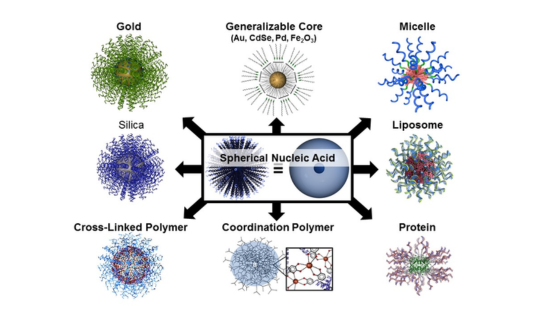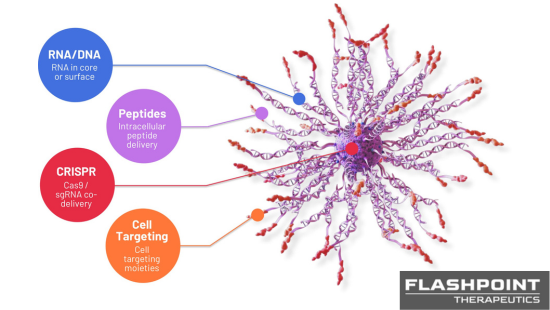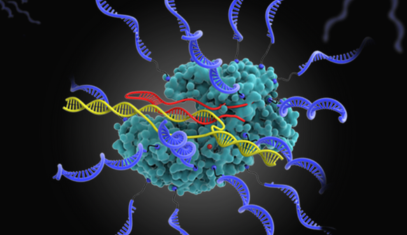
NU Chemistry Impact
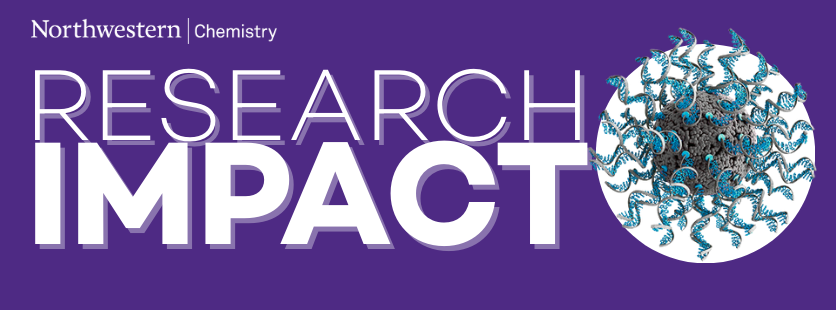
Mirkin Group Research
Through world-class research and translational activities, Mirkin Group members are cultivating a culture of excellence and innovation
The Mirkin Group is led by Chemistry Professor Chad Mirkin, the Director of the International Institute for Nanotechnolgy (IIN) at Northwestern University. The Mirkin Group invented spherical nucleic acids (SNAs), small, globular forms of DNA that are useful as biodisgnostic probes and therapies. They developed classes of SNAs that can stimulate a patient’s immune response to fight both infectious diseases and certain forms of cancer. They were the first to demonstrate that the nanoscale structure of such a vaccine, rather than the components alone, are crucial for dictating its potency, thereby establishing the field of structural nanomedicine. Its insight has opened new possibilities for rapid, low-cost drug development.
SNAs are lead constructs in seven human clinical drugs, and they have already been shown to be curative in particular individuals with skin cancer. SNA diagnostic tools are used in over half the world's top hospitals with millions of tests run on them every year. SNAs are significant in medicine, biology, and the life sciences, but they are also very important building blocks for new types of programmable metamaterials, specifically optical and electronic devices.
Nanotechnology is not just a passing fad that will go in and out with the next scientific trend. Nanotechnology is all-encompassing, involving aspects of chemistry, biology, materials science, engineering, and medicine. The convergence of nanotechnology with other emerging fields like artificial intelligence and synthetic biology is creating new opportunities and applications that were previously unimaginable. The best is yet to come, especially as these fields continue to evolve.
Societal Impact
How is Mirkin Group research addressing key societal problems?
Delivery is a major challenge in drug development, especially with biologics. SNAs, because of their unique structure, rapidly and efficiently enter many types of cells and tissues. By formulating biomolecules like nucleic acids or peptides in SNA form, or using them in tandem with other treatments, like checkpoint inhibitors, the potency of many conventional treatments can be greatly increased. Since SNAs are chemically modular and can be prepared using a variety of biocompatible materials, they can be tailored to treat almost any disease with a genetic basis, and even personalized to a patient’s own tumor type.
Have products based on Mirkin Group research been implemented in the real world?
Products: Over 2,000 products have been commercialized based on research initiated in the Mirkin laboratory. One of these is a medical diagnostic technology now sold by Luminex/DiaSorin known as the Verigene™ system. The Verigene™ system relies on the ability of gold nanoparticle-based SNA probes to latch onto snippets of DNA to detect disease accurately and sensitively at the point-of-care, decreasing the time required for diagnosis. The Verigene™ system is used in over half the world’s top hospitals to detect markers for diseases and disorders ranging from COVID-19 to C. difficile to cardiovascular issues.
Companies Started: Chad Mirkin has co-founded 11 companies, several of which have gone public and been publicly traded. They have employed hundreds of people. One of them is Flashpoint Therapeutics, which is developing SNA-based medicines for cancers and other diseases.
Real World Applications
The Science Behind the Application

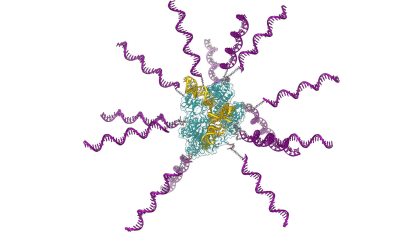
Structure Dictates Effectiveness, Safety in Nanomedicine
SNAs and rational vaccinology
Cancer vaccines getting a boost from science born in Chicago | WGN9

